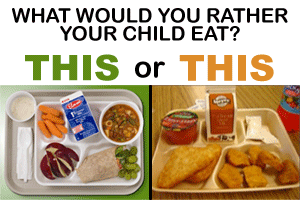A special NATIONAL HUNGER AWARENESS MONTH series |
|
|
|

Members of Congress are prioritizing profits over children’s health and are letting lobbyists tamper with the nation’s key child nutrition programs.
Every year, Congress must approve a spending bill to fund the U.S. Department of Agriculture, which runs the nation’s nutrition programs. This year, Congress is bowing to lobbyist pressure and looking to 1) roll back reforms in school meals and snacks meant to curb childhood obesity, and 2) undercut the Women Infants and Children (WIC) program.
WIC
The WIC program provides nutrition assistance benefits for low-income pregnant and nursing mothers, and covers 53% of all infants born in the U.S. The USDA has very strict rules about what foods can be purchased using WIC benefits.
The program gives vouchers to low-income women to help them purchase healthy foods, particularly fruits and vegetables – but not potatoes. USDA scientists, basing their decision on U.S. food consumption data and under advice of the National Academy of Sciences’ Institute of Medicine, excluded potatoes from the list of approved WIC foods because Americans are already eating plenty of this starchy white vegetable – typically in the form of french fries.
The potato industry is outraged and their lobbyists pushed the bipartisan Senate Appropriation Committee to pass an amendment to the USDA appropriations bill to include potatoes in the WIC package pending further USDA review. The House has followed suit. As the Coalition on Human Needs writes:
In the 40-year history of WIC, this is the first time Congress has intervened in decisions on the food package. However, if this inclusion is ultimately approved by Congress, many advocates worry that other food industries will lobby for their products’ inclusion in the package in the future. “
School Meals and Snacks
In 2010, Michelle Obama’s Let’s Move campaign had the simple but commendable goal of reducing child obesity, which had reached epidemic proportions. Making sure our public schools serve nutritious foods in their cafeterias and snack machines was a key part of this campaign.
Later that year, Congress passed the Healthy, Hunger-Free Kids Act, setting higher nutritional standards for the National School Lunch Program, which serves more than 30 million children in K-12 at a cost of $10 billion. Based on recommendations from the Institute of Medicine, school lunches must now contain low-fat dairy products, lean protein, foods rich in whole grain, and fruits and vegetables.
Today, 90 percent of schools are meeting the new standards put in place in 2012. Additionally, though the obesity rate among young children is finally starting to decline in the U.S., it still affects one in 3 children.

Instead of applauding this progress, some House Republicans are instead trumpeting the complaints of some schools that some say are being pushed by the food service industry about the difficulty and cost of cooking with whole grains. They seek to allow any school or district showing a net loss in their food service program after six months be granted a waiver to opt out of all new standards for a year, specifically:
USDA Secretary Tom Vilsack calls this “a major step backwards for the health of American children” and dozens of anti-hunger and consumer health advocates agree. Margo Wootan of the Center for Science in the Public Interest says,
The USDA is offering a two-year pasta waiver to schools “demonstrating significant challenges” cooking institutional-sized portions of whole-grain pastas until the food industry develops better whole-grain pasta products for schools. Meanwhile, the Center on Budget and Policy Priorities details how the mechanisms of schools’ financial reports are not a sufficient measure of the “net-loss” that Republican House members wish to base their waiver provision on, and that the claims of consequent declining school lunch participation are misleading.
In an impassioned and well-argued plea to Congress last month, the First Lady pleaded with them to reconsider their “campaign for junk food”. The bill will likely come to a vote on the House floor next week and in the Senate later in June or early July, though President Obama is said to be considering a veto.
Take Action
Contact Senators Bob Casey (D) and Pat Toomey (R) as well as your House Representative and tell them the nation’s foods programs must address the nutritional needs of children, not the interests of the most powerful lobbies.
A special NATIONAL HUNGER AWARENESS MONTH series |
|
|
|




No comments yet.